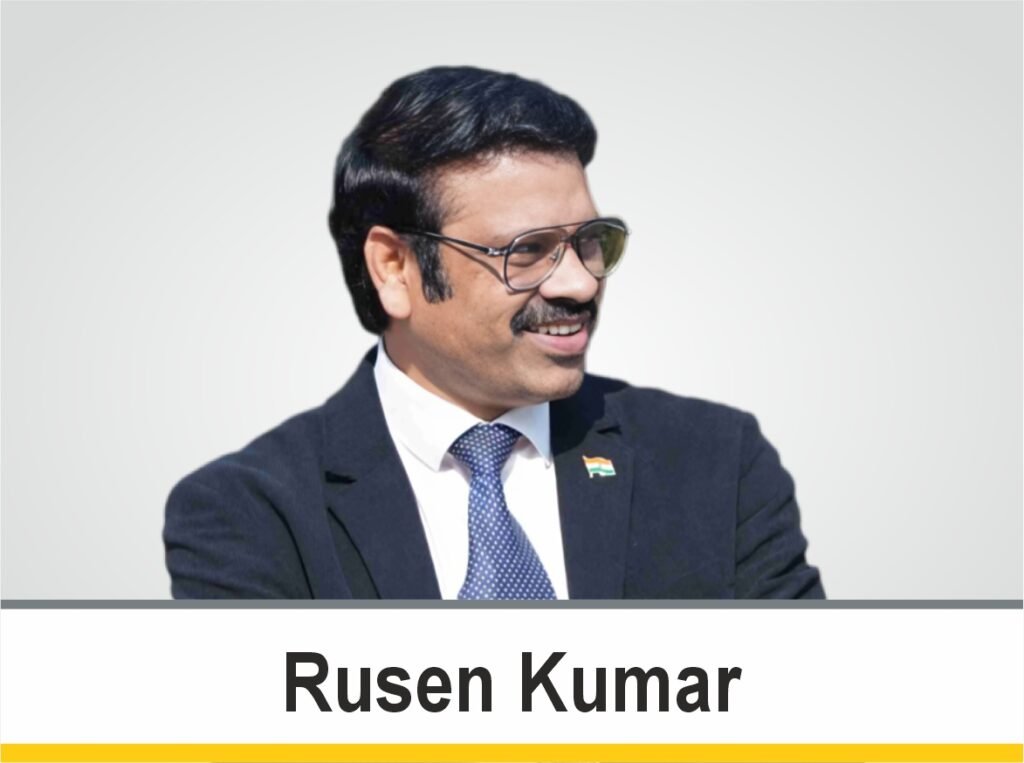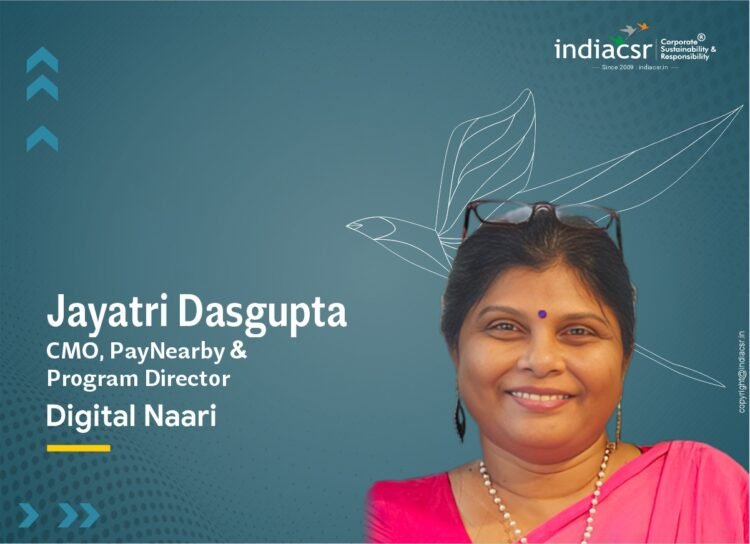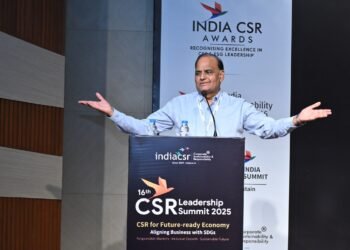Empowering Women at the Last Mile: A Conversation on Digital Naari’s Social Impact

By Rusen Kumar
NEW DELHI (India CSR): Jayatri Dasgupta, CMO of PayNearby and Program Director of Digital Naari, leads a transformative initiative aimed at empowering women in Tier II, Tier III, and rural India. Digital Naari equips women with the skills, tools, and confidence to operate as digital and banking service points within their communities. The program enables women to offer essential services, including banking, insurance, credit, mutual funds, healthcare, hygiene products, and government advisory support, creating both financial independence and social recognition. By partnering with government agencies, NGOs, self-help groups, and livelihood missions, Digital Naari ensures scalable impact, turning women into micro-entrepreneurs who uplift their families and communities while fostering long-term socio-economic change.
1. How does the Digital Naari initiative create social impact for women in Tier 2 and beyond?
Women account for nearly half of the population, yet their participation in India’s workforce, especially in rural areas, remains critically low. These vast untapped potential underscores the urgent need for focused interventions and supportive ecosystems to help rural and semi-urban women overcome barriers and achieve financial independence.
PayNearby’s Digital Naari initiative was introduced to bridge these gaps by equipping women with the skills, tools, and confidence to operate as digital and banking service points within their own communities, thereby creating social impact at scale.
The program offers women the flexibility to work from home or a store, select from over 25 essential services based on local demand, and operate at their own pace. Our agents deliver a comprehensive suite of offerings, including banking (ATM, account opening, deposits), insurance, credit, mutual funds, healthcare (telemedicine, e-clinics), hygiene products, and government advisory services.
Through partnerships with government agencies, NGOs, self-help groups, and microfinance institutions, we provide training, resources, and ongoing support. Collaborations with various livelihood missions, including Uttar Pradesh State Rural Livelihood Mission (UPSRLM), Rajasthan Grameen Aajeevika Vikas Parishad (Rajeevika), and Grameen Foundation India are helping countless women towards economic independence and societal recognition through our Digital Naari app.
Today, Digital Naari is making a socio-economic impact in thousands of villages and small towns, transforming women into micro-entrepreneurs who uplift their families and their communities.
2. How is this social impact initiative different from traditional CSR programs?
Unlike many traditional CSR programmes that rely heavily on external funding or grants and are often limited to imparting knowledge, training, and skills for a potential job, the program goes a step further. We not only provide comprehensive, grassroots-tailored training for financial and digital literacy, but also equip women with the tools and a ready platform to immediately put that knowledge into practice and start earning. This makes the Digital Naari a long term self-sustaining, social impact movement creating a socio-economic impact.
Each Digital Naari, or “banker didi,” operates from home or runs her own store offering services such as banking, payments, insurance, credit, mutual funds, and more. Every transaction they facilitate earns them a commission, creating a steady income stream. This entrepreneurial model not only ensures long-term financial independence for the women but also guarantees that essential services remain consistently available to their communities without being reliant on periodic CSR funds.
3. Can you share data or examples that showcase how Digital Naari is changing the earning potential, financial independence, and social status of women in Tier II, Tier III, and rural regions?
Take the example of Durga Naktode from Bagalbandh, a small village in Maharashtra’s Gondia district. Once part of a local self-help group, Durga joined Digital Naari after a community awareness session. She now operates a CSP offering cash withdrawals, money transfers, bill payments, mobile recharges, and more – services that earlier required villagers to travel 12 kilometres to the nearest bank.
Today, Durga serves over 200 families and manages transactions worth more than Rs 5 lakh every month. Beyond banking, she promotes health awareness, sells sanitary pads, and talks to young women about menstrual hygiene. Stories like hers illustrate how Digital Naari is not just boosting income—often Rs 3,500–Rs 5,000 per month—but also elevating women’s social status and enabling them to become trusted agents of change in their communities.
Another example is Hema Saroj, a 35-year-old single mother from Azamgarh. After losing her husband, she joined the (Uttar Pradesh State Rural Livelihood Mission) UPSRLM-PayNearby BC Sakhi programme. Through training and community trust, she began offering digital services like ATM withdrawals, EMI collection, ticket bookings, and account openings. In just two years, she has facilitated over Rs 5 crore in transactions and is now known as the “Banking Didi” in her village. There are many such examples as part of the Digital Naari program.
4. Many social initiatives depend heavily on CSR budgets or external funding. How is Digital Naari designed to be self-sustaining while ensuring long-term impact?
The Digital Naari model is built for independence from the outset. The model scales because it is phygital and demand-driven: women deliver essential, everyday services that households need year-round, ensuring steady footfall and repeat transactions.Collectively, Digital Naaris associated with the platform facilitate over ₹10,000 crore in annual transactions, with over 60% first-time entrepreneurs earning on average Rs 3,500–Rs 5,000 per month, showcasing the financial viability of the model at the last mile.
The program aligns seamlessly with national programmes like the ‘Lakhpati Didi’ initiative, which aims to empower women to earn over Rs 1 lakh annually and become economic leaders at the grassroots. By onboarding over 2 crore Lakhpati Didis by 2030, we are committed to enabling 50+ crore women to access banking, digital services, and government schemes, directly contributing to the government’s vision of a financially empowered and inclusive Bharat.
This financial self-reliance ensures that the impact is not only immediate but also sustainable, while women continue to grow their businesses, serve their communities, and inspire other women to follow their path.
5. How are you aiming to expand the reach of this program?
We will continue expand partnerships with government agencies, NGOs, and mission-aligned institutions, while enhancing our platform’s capabilities to serve the evolving needs of last-mile users. By doing so, we aim to nurture a future where every woman, regardless of geography, can access dignified livelihood opportunities and lead change from within her community.
Over the next three years, PayNearby aims to:
- Enable self-employment for at least 1 million women, equipping them with the tools, services, and training needed for sustainable income generation
- Help them evolve into Lakhpati Didis, earning ₹1 lakh or more annually through consistent service delivery
- Reach over 100 million households, providing them easy access to financial, digital, and social services through this robust, women-led network
***
About Rusen Kumar
Rusen Kumar is a distinguished journalist, author, and visionary knowledge entrepreneur specializing in Corporate Social Responsibility (CSR) and sustainability in India. He is the founder and managing editor of India CSR Network, a leading platform dedicated to CSR and sustainability issues.
Copyright@IndiaCSR
Showcase your CSR achievements and share your insights with India’s leading CSR platform.
Contact us at biz@indiacsr.in I 9981099555 to feature your success stories and interviews.






















